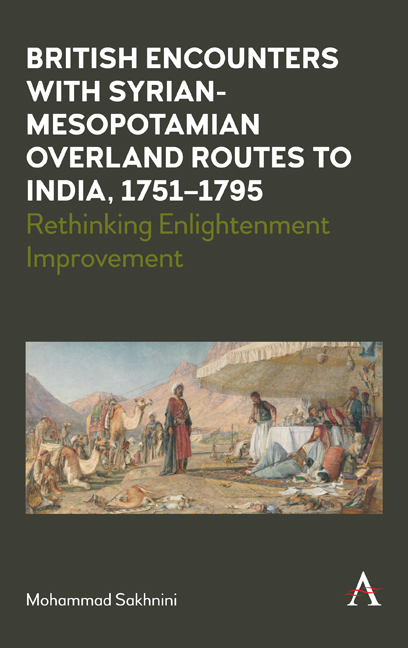 British Encounters with Syrian-Mesopotamian Overland Routes to India, 1751-1795
British Encounters with Syrian-Mesopotamian Overland Routes to India, 1751-1795 Book contents
- Frontmatter
- Contents
- Acknowledgment
- Introduction: Pluralising The Enlightenment: Improvement And Cross-Cultural Encounters
- Chapter One Improvement of Knowledge: John Carmichael’s A Journey From Aleppo to Busserah, Over the Desert (1772)
- Chapter Two Polite Englishman in the East: Edward Ives’s Journey from Persia to England (1773)
- Chapter Three Commerce, Virtue and Improvement: Abraham Parsons’s Travel in Asia and Africa (1808)
- Chapter Four Henry Abbott: A Cosmopolitan in Cities and Deserts
- Chapter Five Eyles Irwin’s Travels: The Politics of Adventure in the Levant
- Chapter Six Political and Moral Improvement: Donald Campbell, A Journey Overland to India Partly by A Route Never Gone Before by Any European (1795)
- Conclusion
- Unpublished Manuscripts
- Reference List
- Index
Chapter Two - Polite Englishman in the East: Edward Ives’s Journey from Persia to England (1773)
Published online by Cambridge University Press: 15 November 2023
- Frontmatter
- Contents
- Acknowledgment
- Introduction: Pluralising The Enlightenment: Improvement And Cross-Cultural Encounters
- Chapter One Improvement of Knowledge: John Carmichael’s A Journey From Aleppo to Busserah, Over the Desert (1772)
- Chapter Two Polite Englishman in the East: Edward Ives’s Journey from Persia to England (1773)
- Chapter Three Commerce, Virtue and Improvement: Abraham Parsons’s Travel in Asia and Africa (1808)
- Chapter Four Henry Abbott: A Cosmopolitan in Cities and Deserts
- Chapter Five Eyles Irwin’s Travels: The Politics of Adventure in the Levant
- Chapter Six Political and Moral Improvement: Donald Campbell, A Journey Overland to India Partly by A Route Never Gone Before by Any European (1795)
- Conclusion
- Unpublished Manuscripts
- Reference List
- Index
Summary
The extensive intercourse, which is now kept up between nation and nation, has enlarged and expanded the human heart to a degree unknown before, even under all the advantages of which Philosophy so proudly boasted.
—Samuel Evers, A Journal Kept on a Journey from Bassora to Baghdad over the Little Desert (1779)Edward Ives’s A Voyage from England to India (1773), as we shall see, is the first English travel book about the overland routes in which we find an Englishman from a humble background, a surgeon by profession, telling his readers how Ottoman governors in different cities in Syria and Mesopotamia highly respected English travellers in their land. He reported how he and his companions enjoyed the hospitality of Muslim rulers, showing how the English were highly respected for their polite manners and accommodating behaviour towards non-Europeans. Travelling in the East, as this chapter shows, offered Ives opportunities to reinvent the Self abroad as one of improvement, respectability and politeness; the idea of being among others – a manifestation of a ‘relational’ condition in the making of the modern self, one ‘outwardly or social turned’ as Dror Wharman has argued – allowed Ives to reimagine the old regime of identity in England in which boundaries were strictly demarcated by fixed markers in contrast to the modern age known for mutability and transience, what Marshall Berman in 1982, via Karl Marx’s The Communist Manifesto, called, ‘all that is solid melts into air’. Before he set out to the East, Ives was one of those ‘rambling mind[s] and a fortune too narrow to allow’ one ‘to travel like a gentleman’, as Alexander Hamilton in 1739 put it (Hamilton 1739: xxvi). But the idea of joining the Royal Navy as a surgeon gave Ives many opportunities to rub shoulders with people, European and non-Europeans, from different social and economic backgrounds, which enabled him to perform the character of a modern gentleman whose manners and appearance rather than his lineage, family background and religious piety defined his identity. In his travel book, Ives used polite performances and the ethos of improvement well known among the upwardly mobile middling ranks of eighteenth-century Britain to negotiate the freedoms and challenges of modernity.
- Type
- Chapter
- Information
- British Encounters with Syrian-Mesopotamian Overland Routes to India, 1751-1795Rethinking Enlightenment Improvement, pp. 57 - 94Publisher: Anthem PressPrint publication year: 2023
